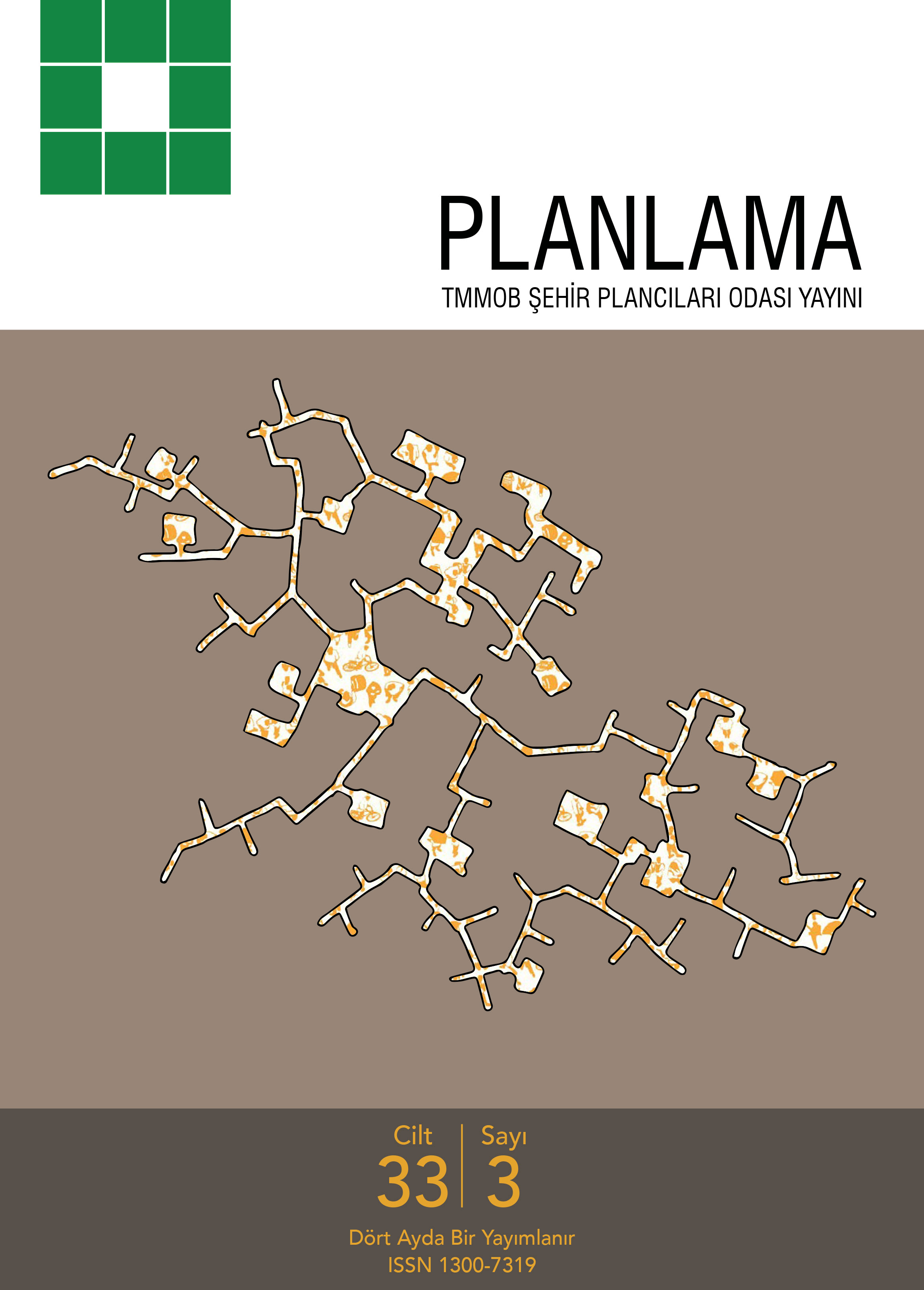Mekânsal Planların Çevresel Sürdürülebilirlik Performansının Belirlenmesine Yönelik CBS Aracı Geliştirilmesi
Emin Yahya Mentese1, Azime Tezer1, Mehmet Demir21İstanbul Teknik Üniversitesi, Şehir ve Bölge Planlama Bölümü, İstanbul2RKSoft Mühendislik Bilgisayar Programlama Ltd.Şti.
Mekânsal gelişimin temel bileşeni olan planların; uygulandıkları alan üzerinde yaratacağı etki planlama sürecinin öncelikli konularından biridir. Bu nedenle planlama sürecinde söz konusu etkinin analiz edilmesi ve anlaşılması önemli bir aşamayı oluşturmaktadır. Bu çalışma, planlama sürecine bir katkı sunma ve bu süreci iyileştirme amacıyla; planların uygulanacakları mekânın çevresel sürdürülebilirlik potansiyeline olan etkisini analitik biçimde modelleyebilmeyi hedeflemektedir. Böylece planın doğal kaynakların kullanımına, tüketimine ve sürdürülebilmesine nasıl katkı/etki sağladığı ölçülerek; henüz hazırlık aşamasında bu bakış açısıyla değerlendirilmesi sağlanabilmektedir. Günümüzde mekânsal planların sebep olabileceği çevresel sonuçlar, mevcut doğal çevrenin boyutu, büyüklüğü veya kapladığı alanı ne kadar artıracağı veya azaltacağı, kişi başına düşen yeşil alan miktarını ne oranda değiştirdiği gibi bileşenler üzerinden değerlendirilmektedir. Buna karşın bir planın mevcut ekosistem işleyişine olası somut etkisi analitik bir yöntemle ele alınmamaktadır. Örneğin bir planın hava kalitesinin nasıl değişeceği; su kaynaklarının gelecekteki yeterliği ve kullanımı; biyolojik çeşitliliğin ne oranda devam edeceği tam olarak analiz edilmemekte veya edilememektedir. Bu yaklaşım planların uygulandıkları mekân üzerinde öngörülemeyen etkiler yaratmasına ve bu alanların yaşanamaz bir hale dönüşmesine neden olabilmektedir. Planlama sürecindeki bu eksikliği gidermeye yönelik olarak, bu araştırma ile geliştirilen model; çevresel sürdürülebilirliğin ekosistem servisleri temel alınarak tanımlanması ve özellikle üst ölçek stratejik mekânsal planlarla önerilen fonksiyonların ekosistemler tarafından sağlanan servisleri ve faydaları ne şekilde etkilediğinin ortaya koyulmasını içermektedir.
Gerçekleştirilen araştırmalarda mekânsal kullanımın ekosistem servisleri sağlama potansiyelinin anlaşılmasına yönelik etkin yöntemler geliştirildiği tespit edilmiştir. Bu yöntemler arasında Burkhard ve diğ. (2009) tarafından geliştirilen matris modeli önemli bir yere sahiptir. Söz konusu çalışma ile arazi kullanım türlerinin ekosistem servisi sağlama potansiyelleri uzman görüşleri ve ölçüme dayalı veriler temel alınarak puanlandırılmaktadır. Bu araştırmada söz konusu matris modeli yeniden ele alınarak mekânsal kullanımın yalnızca sağladığı faydaları değil neden olduğu etkileri de kapsayacak şekilde genişletilmiştir. Sonrasında mekânsal kullanımın hem sağladığı fayda hem de neden olabileceği zarar Coğrafi Bilgi Sistemleri (CBS) tabanlı bir yazılım geliştirilerek değerlendirilmiş ve mekânsal plan ile planın uygulanacağı arazinin çevresel sürdürülebilirlik performansının analiz edilmesi sağlanmıştır. Bu sayede mekânsal planların çevresel sürdürülebilirlik ile ilişkisi modellenmiştir.
Development of a GIS Tool for the Identification of Environmental Sustainability Performance of Spatial Plans
Emin Yahya Mentese1, Azime Tezer1, Mehmet Demir21Istanbul Technical University, Department of Urban and Regional Planning, Istanbul2RKSoft Engineering Computer Programming LLC.
Impacts caused by plans that are the primary components of spatial development are one of the initial subjects of the planning process. Therefore, analysing and understanding the impacts of the plans constitute a critical stage in this process. With the aim of contributing and enhancing planning procedures, this study focuses on modelling the impacts of plans on environmental sustainability state of the planning area with an analytical approach. Thereby a plan can be assessed based on its impact/benefit on the use, consumption and sustaining of the natural resources. Today, possible environmental results of the plans are estimated mostly based on changes in quantity values such as changes of size or area of natural environments or changes of green space area per person. On the other hand, a plans tangible results on the ecosystem process are not analyzed via an analytical method. For example, a plans impact on air quality, adequacy of water resources or continuity of biodiversity is not or cannot be assessed. This sort of implementation leads to unexpected effects occurred by plans and transforms cities into unlivable areas. To remove this gap in planning process; this research focuses on development of a model that enables to define environmental sustainability as a function of ecosystem services and evaluate the impacts of especially strategic level spatial plans on services and benefits provided by ecosystems. In recent studies, there are various methods developed for understanding the ecosystem service potential of land uses. Among these models, Burkhard et al.s (2009) study is notable by implementing an efficient matrix model that includes ecosystem service potentials of land uses. The values of the potential are gathered by the expert-based and data-based scoring of each land uses ecosystem services potential.
In this research matrix model is re-evaluated and expanded to include the impacts of land uses in addition to ecosystem services. Hence both the benefits and harms on ecosystems occurred by land use are involved in the matrix. Then these values are integrated into GIS; consequences of a plan on current land are and sustainability performance of the plan and implementation area is analyzed. As a result, relationship between environmental sustainability and land use plan is modelled.
Sorumlu Yazar: Emin Yahya Mentese, Türkiye
Makale Dili: Türkçe












